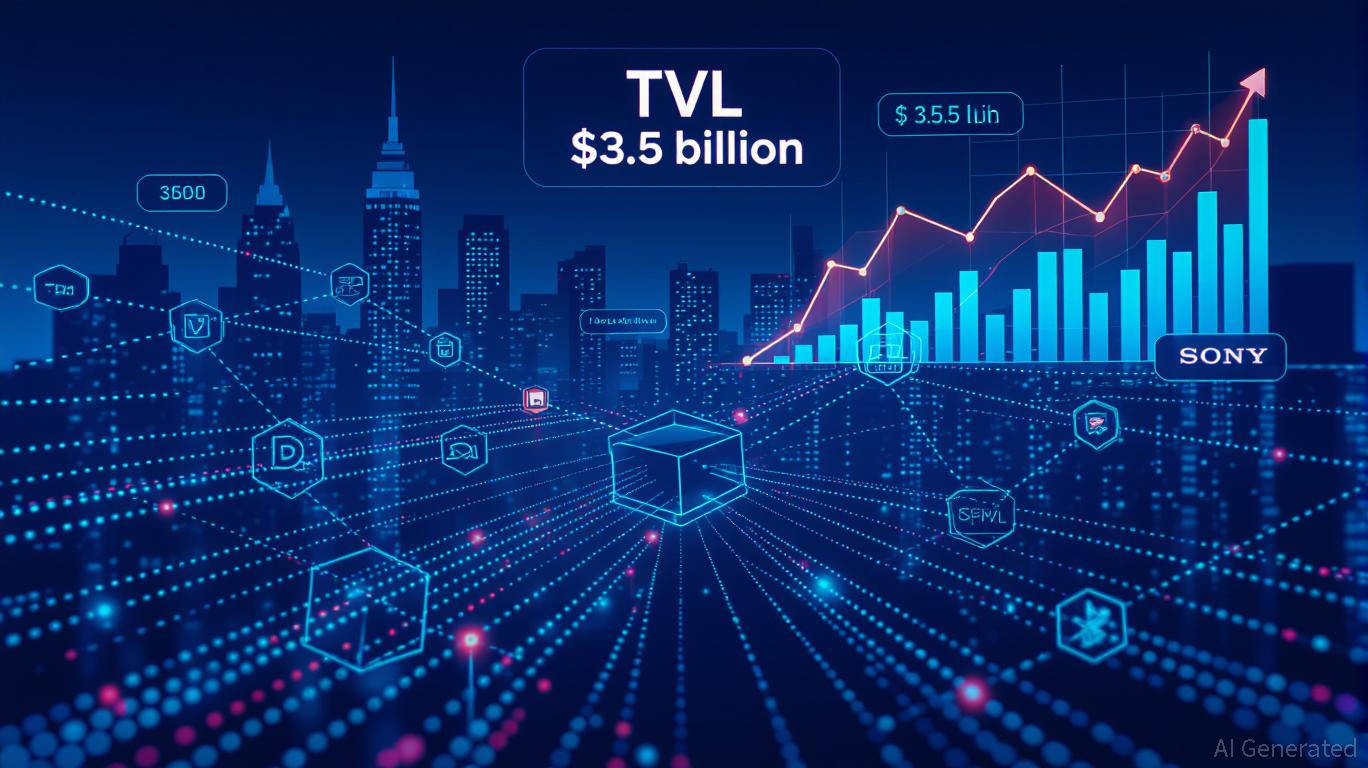Why Are Zero-Knowledge (ZK) Cryptocurrencies Gaining Momentum in 2025
- Zero-knowledge (ZK) cryptocurrencies surged in 2025 due to scalability breakthroughs like ZKsync's 15,000 TPS Atlas upgrade and StarkNet's ZK-native application ecosystem. - Institutional adoption accelerated as Deutsche Bank and Sony leveraged ZK for confidential settlements and digital rights management, reducing gas fees by 70% for high-frequency trading. - Regulatory clarity from U.S. GENIUS/CLARITY Acts and Ethereum's zkEVM roadmap boosted institutional confidence, with crypto allocations projected
Scalability Breakthroughs: The
ZK
Layer 2 Revolution
ZK rollups have set new standards for blockchain scalability by using cryptographic proofs to confirm transactions off-chain, all while preserving security and openness. The ZKsync Atlas Upgrade, introduced in October 2025, is a prime example of this advancement. With its modular Layer 2/3 framework,
These developments are

Institutional Adoption: From Compliance to Confidentiality
More and more companies are turning to ZK solutions to overcome regulatory and operational obstacles. Deutsche Bank and Sony have
The Ethereum Foundation’s strategic plan further supports this movement. By
Analyst Commentary: Diversification and Regulatory Clarity
Institutional involvement in ZK cryptocurrencies has moved beyond mere speculation. The Sygnum 2025 Future Finance Report notes that 57% of institutional investors now consider digital assets a key part of their diversification strategy,
Additionally, ZK’s reach is expanding into mainstream uses—such as Google’s ZK identity platform—showing its adaptability beyond just finance. Experts at Yellow.com believe ZK rollups will become the dominant blockchain scaling solution, thanks to their security and efficiency advantages over optimistic rollups
Challenges and the Road Ahead
Despite these advances, obstacles remain. Integrating with older systems is still a challenge in industries like healthcare and manufacturing,
Conclusion
The momentum behind ZK cryptocurrencies in 2025 is driven not just by speculation, but by their ability to solve core issues of blockchain scalability and privacy. With more institutions coming on board and protocol upgrades like ZKsync’s Atlas setting new standards, ZK technology is set to underpin the next era of financial infrastructure. For investors, this marks a crucial turning point: a technology that unites decentralized progress with institutional needs.
Disclaimer: The content of this article solely reflects the author's opinion and does not represent the platform in any capacity. This article is not intended to serve as a reference for making investment decisions.
You may also like
Bitcoin News Update: Grayscale Submits IPO Application Amid 20% Revenue Decline and Intense Cryptocurrency Market Rivalry
- Grayscale Investments files for NYSE IPO as "GRAY", managing $35B in crypto assets including its flagship Bitcoin product. - The SEC filing follows a July S-1 submission, reflecting broader crypto sector trends with firms like Circle and Gemini also going public. - 2025 revenue dropped 20% to $318.7M due to competitive pressures and crypto market volatility, despite 2023 ETF conversion boosting credibility. - The IPO roadshow with Morgan Stanley and others targets $30-33B valuation, with listing expected

Shutdown Chaos: Airlines Face Disruptions Amid Political Stalemate Halting Flights
- Delta CEO Bastian condemned the government shutdown, blaming unpaid air traffic controllers for 500 flight cancellations and traveler chaos. - Trump threatened pay cuts for absent controllers while offering $10k bonuses, exacerbating staffing shortages at 30 major U.S. airports. - FAA reported 20-40% controller absences daily, triggering 10,000+ delays and 2,800 cancellations as airlines waive fares and offer refunds. - Political leaders urged a shutdown end, but FAA's 10% flight reduction directive pers
COAI Token Fraud Unveiled and Its Impact on DeFi Safety: Evaluating Regulatory Preparedness and Shortcomings in Investor Safeguards within Developing Cryptocurrency Markets
- COAI token's 2025 collapse exposed DeFi vulnerabilities in emerging markets due to governance failures and regulatory ambiguity. - CLARITY Act's vague AI token definitions and U.S. regulators' conflicting classifications (securities vs. commodities) worsened market uncertainty. - Southeast Asia's crypto scams, including She Zhijiang's Myanmar operation, exploit weak governance and jurisdictional loopholes to defraud $10B annually. - IRS DeFi rules face legal challenges over privacy concerns, while platfo

UK Faces Stablecoin Challenge: Balancing Innovation and Financial Security
- UK faces pressure to launch GBP stablecoin to compete globally, urged by ClearBank CEO Mark Fairless at Web Summit 2025. - BOE proposes 40% central bank deposit reserves for GBP stablecoins, with £20k/£10m user/business limits to mitigate systemic risks. - Critics argue 40% unremunerated reserves could stifle innovation, putting UK issuers at disadvantage compared to US/EU frameworks. - Regulatory balancing act emerges as UK aims to position itself as crypto innovation hub while maintaining financial sta